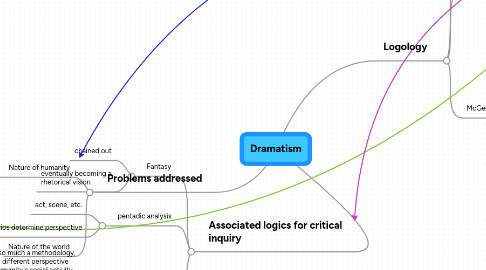
1. Associated logics for critical inquiry
1.1. Fantasy
1.1.1. chained out
1.1.2. eventually becoming a rhetorical vision
1.2. pentadic analysis
1.2.1. act, scene, etc.
1.2.2. ratios determine perspective
1.3. Narrative paradigm
1.3.1. Not so much a methodology, but a different perspective on humanity's social activity
1.3.1.1. narrative fidelity
1.3.1.2. narrative probability
1.3.2. synthetic; incorporates/explains traditional views of rationality
2. Problems addressed
2.1. Nature of humanity
2.1.1. symbol using/misusing animal
2.1.1.1. Action/motion
2.1.1.1.1. conscious
2.1.1.1.2. unconscious
2.1.1.1.3. Action is fundamentally social; we always orient ourselves towards others
2.1.2. self as a polarity
2.1.2.1. physical being
2.1.2.2. symbolic self; identity
2.2. Nature of the world
3. Logology
3.1. Burke
3.1.1. Religious connotation, but secularized
3.2. Words about words
3.2.1. possibly a methodology
3.2.2. Words have real, if immaterial force
3.2.3. Reality of rhetorical form
3.2.3.1. performance of/through language
3.2.3.2. symbolic motivation
3.3. McGee
3.3.1. Ideograph
3.3.1.1. Manifestation of ideology
3.3.1.2. Building block of ideology
3.3.1.3. diachronic - history linking past meanings to present ones
3.3.1.4. synchronic - links between ideologies in the present
3.3.1.5. Appeals to higher a higher order allows for understanding; yet, variations that are culture dependent create differences in perceptions of higher order ideographs (e.g. survival of the body vs. survival of the soul)
